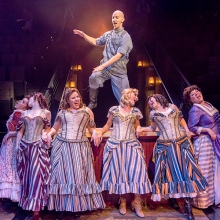Filichia's Features: Working
Filichia's Features: Working
So when’s the last time you took a good look at Working?
The script and score for the musical that opened on Broadway more than a third-of-a-century ago keeps getting facelifts.
The newest one was unveiled last month at Monmouth University in West Long Branch, New Jersey. Music Theatre International will soon make it available. (Watch this space!)
As Monmouth’s director Nicole Ricciardi wrote in the program, “The world has changed a great deal since 1978, when Studs Terkel’s book Working was first adapted for the stage.”
Indeed. Outsourcing was hardly an issue back then, but now Working addresses it through Raj. He’s in India, giving tech support to customers who are located at least one ocean and continent away. And while The Teacher has always been a character in Working, she now has new dialogue on how “we confiscate weapons and drugs at the door.”
As before, The Housewife still sings that she’s “Just a Housewife” and states that when she’s a dinner party guest, she has little to add to the conversation. Now, however, this sequence has more resonance, for today’s housewife feels even more displaced given that the majority of women her age are in the workforce.
So Ricciardi was accurate when she wrote, “Our 2012 production of Working is more than a revival. It is a complete re-imagining by Stephen Schwartz, who graciously gave his permission to mount the new show here at Monmouth University.”
This new version does retain songs by the original six-pack of songwriters: Craig Carnelia, Micki Grant, Mary Rodgers, Susan Birkenhead, Stephen Schwartz and James Taylor. But it also has two new and terrific songs by Tony-winner Lin-Manuel (In the Heights) Miranda.
One tells of a McDonald’s employee who lives to leave the cash register and make a “Delivery.” For those few fleeting moments when his bosses aren’t watching, he’s on his own and in control of his own life.
Later, The Caregivers in a nursing home sing about the joy they get on “A Very Good Day,” when an old and mentally infirm person suddenly comes alive. This burst of awareness can last for a moment, an hour or (far less frequently) an afternoon. It’s an unexpected bonus for people who “do the work that no one else will do.”
Other new characters include Candy Cottingham, the high society fundraiser. Alas, she doesn’t make us believe that she’s really devoted to her latest cause of helping Nicaraguan refugee children. She does, however, convince us of her frustration when she says “It’s hard to separate people from their money.” (Anyone who’s tried to sell theater tickets would readily agree.)
There’s The Community Organizer who believes that “we have it inside ourselves to change things,” because “History is a lot of little people.”
On the other end of the spectrum is Rex Winship, a hedge fund manager. He’s so unfeeling about his competitors (let alone his staff) that he makes the shark in Jaws seem like a guppy. So when Winship says that after retirement he’d like to teach kids, one fears what horrible values he’ll impart to young impressionable minds.
But the writers are careful not to make Winship (or any of their other characters) a caricature. He also makes some good points, including the painful truth that “If a kid wants to make it, he’s got to be willing to work long hours.”
That Working “tells it like it is” makes it especially valuable for teens, both to see and to perform. The Receptionist tells of her naiveté in assuming that after high school there’d automatically be “a Mercedes at the door.” Kids – especially the pampered ones -- do expect only sunshine and lollipops from life. They may miss the irony of The Student Intern’s statement: “I always wanted to be a golfer, but realistically I’ll be an entrepreneur.” But adults in the audience will be amused to hear the lad assume that becoming an entrepreneur (and all that entails) is “realistically” achievable.
Because high schoolers must soon choose what they’ll do once they’re graduated, Working gives them a frank and genuine look into the worst aspects of many professions. And if any kid is, God forbid, thinking of dropping out of school, Working may well convince him otherwise.
For example, some kids may think that steelworkers relish not being cooped up in an office, breathing in fresh air, building up their muscles and having good times after hours with their fellow workers. But here’s The Steelworker saying that his life is simply “Pick it up, put it down. Pick it up, put it down.” He’s talking about a beam that’s hardly a sunbeam. And he may well do it, as The Millworker rues, “For the rest of the morning … for the rest of the afternoon … for the rest of my life.”
The Steelworker has also come to the sad conclusion that “a job defines you” and that it spurs others “to make judgments about you.” He still feels the sting of what happened last year: the college student who was working with him for the summer was astonished to see that this laborer liked to read. Observations such as this can turn a blue-collar worker purple.
Working informs kids that even the so-called glamorous jobs for which they’ve been lusting may be far less exciting than they’ve imagined. Getting free trips to Paris is a certainly very good fringe benefit for a Flight Attendant. But the woman who does this job long ago realized that she’s nothing but a glorified waitress.
Then again, there’s a genuine Waitress on hand to remind us that Working is not a non-stop dourfest, and that jobs can be what you make of them. In what might be the score’s best song, Stephen (Wicked) Schwartz has The Waitress sing that “It’s an Art” to do what she does. In the joyous song, Schwartz delivers many delicious triple-rhymes, such as, “Though the chef / may be deaf/ I stay diplomatic / If I give him static / He might burn the haddock.”
For the parents in the audience, Working will remind them of all the terrible jobs to which they could have been sentenced. Some characters dolefully describe themselves as “lifers” – suggesting that they’re not much better off than prisoners who have no possibility of parole. Many adult playgoers just might emerge from the theater feeling appreciative of where they’ll be tomorrow morning at nine a.m.
Ricciardi used merely three young men and three young women. In a way, their playing so many roles subliminally suggested that we all go through a lot of jobs in our lives. So Working does work with a small cast.
But there are assets in doing it with a large one, too. Considering that actors have less material than usual to memorize and master, they’ll become far more accomplished and efficient with it.
Of course, some directors shy away from choosing shows that require large casts. They’ve learned through bitter experience that getting everyone to show up for rehearsals on certain dates and times inevitably results in an absence or two or seven. Directing with less than a full cast can be maddening. (“Stand here and pretend you’re Joy.”) Working, however, consists mostly of self-contained soliloquies and solos. Thus, a director can often rehearse who’s on hand and get to the absentees the next time.
Ricciardi’s six performers also reiterated the most refreshing aspect in casting Working: leading man and leading lady looks are not requirements. This is, after all, a show about the common man and woman. Part of the point of the show is that The Average Joe and Jane are important. Those dazzlers who routinely play romantic leads may not be as useful here.
It’s also a cast that features all age groups – from The Newsboy to The Retiree – and diverse nationalities, too. Thus, the performers get to meet and learn from people unlike themselves, and profit from the experience. At the very least, the musical will also inspire all to be much nicer to the workers they encounter in everyday life.
Working also points out how quickly time passes, and how some people must realistically give up on their own goals. “If you can’t improve yourself, you improve your kids,” says a worker. One way to improve your kids is by having them see – or perform in -- Working.
You may e-mail Peter at pfilichia@aol.com. Check out his weekly column each Tuesday at www.masterworksbroadway.com and each Friday at www.kritzerland.com. His newest book, Broadway Musical MVPs, 1960-2010: The Most Valuable Players of the Past 50 Seasons, is now available through Applause Books and at www.amazon.com.
Share
Callboard
-
Shake and shimmy it with the #Hairspray20Challenge! Join MTI and Broadway Media in celebrating 20 years of #Hairspray. Duet this here or find us on TikTok! Special thanks to @broadwaymedia and @jammyprod. Choreography Guides are a licensor official resource that provides step-by-step instruction from Broadway and professional choreographers for your productions! Visit @broadwaymedia to learn more. #mtishows #youcantstopthebeat #hairspraymusical #goodmorningbaltimore
View on Instagram



























